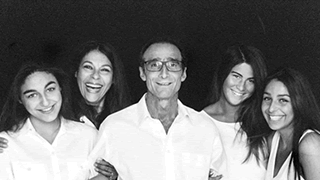British businessman ends his life at Dignitas despite not being terminally ill

A 54-year-old British father-of-three has ended his life at the Dignitas assisted suicide clinic in Zurich - even though he was not terminally ill.
Businessman Jeffrey Spector, of Lancashire, feared that he would become paralysed after being diagnosed with a tumour on his spine.
However, he was not terminally ill and admitted that he was “jumping the gun” and “going too early.”
His wife Elaine, 53, and his daughters Keleigh, 21, Courtney, 19, and Camryn, 15, were with him when he took a lethal dose of barbiturate.
Mr Spector was photographed having a final meal with loved ones hours before he died.
In the photograph, published by the Mail Online, Mr Spector was surrounded by family and friends, including his two daughters, who could be seen smiling at the camera.
Mr Spector’s wife Elaine defended the decision, stating that the family “supported and respected Jeffrey’s decision 100 per cent.”
Concern
However, concerns have been raised over the number of people who have ended their lives under laws permitting assisted suicide and euthanasia abroad, despite not being terminally ill:
- In May 2013, an 83 year old British man became the first person to end his life at Dignitas because he was diagnosed with dementia, even though he was still in the early stages of the condition and, according to experts, could had lived for years.
- In April 2013, an elderly woman died at Dignitas because she was not prepared to adapt to a world in which she felt “technology took precedence over humanity”. The 89-year-old, who was not terminally ill, said she feared that she faced a choice of either adapting to a world of emails and television, or death.
- In January 2013, two deaf twin brothers were euthanised in Belgium even though neither was terminally ill or suffering from unbearable pain. Marc and Eddy Verbessem (45), who were both born deaf, requested euthanasia after finding out that they would soon turn blind due to a genetically caused condition.
- A Dutch doctor ended the life of a woman under the country's euthanasia laws after she complained she did not want to live in a care home. The woman, who was partially paralysed by a stroke, died by a lethal injection at the Levenseindekliniek – an end of life clinic which offers services to patients whose doctors refuse to accept requests for euthanasia.
- In 2013, a Belgian woman died under the country’s euthanasia laws because she was unhappy with a sex change operation.
A study conducted last year found that around 16 per cent of people who end their lives Dignitas have no underlying illness, with “weariness of life” being cited increasingly as a reason for choosing an assisted suicide.
The Swiss study, published in the International Journal of Epidemiology, found that lonely people, the rich, the educated and the divorced were the groups most inclined to seeking an assisted suicide.
Researchers found that 740 of the 1,300 who opted for assisted suicide, were women. Twenty people who died in the clinics listed a mental illness as the reason for ending their lives, even though it is legal only for persons judged competent to make the decision.
Last year, European assisted suicide watchdog, Professor Theo Boer, warned the UK against the legalisation of assisted suicide and euthanasia, saying that it would be the start of a 'slippery slope' towards the widespread killing of sick and vulnerable people.
Professor Boer said his warnings were based on the Netherlands’ experience of legalising assisted suicide, which has seen the number of deaths double in the past six years.
He noted that assisted suicide in the Netherlands had gone from being a last resort to now being a normal procedure, with the practice on the way to becoming a 'default mode' of dying for cancer patients.
The Professor, who formerly supported the provision of assisted suicide, said: “I used to be a supporter of the Dutch law. But now, with 12 years of experience, I take a very different view.”
Andrea Williams of Christian Concern said: “This disturbing case demonstrates that once assisted suicide is introduced, the categories of those who are eligible for the procedure will continue to increase. Any safeguards , such as limiting the procedure to terminally ill people, will not work and it will be impossible to prevent abuse of the law by medical practitioners.
“Attempts to introduced assisted suicide in the UK must be resisted to protect the most vulnerable in our midst.”
Related News:
Dutch assisted suicide watchdog warns Britain against 'slippery slope' towards widespread killing of the sick
Horror of healthy people opting to end their lives in Swiss suicide clinics
Belgian killed by euthanasia after sex change operation
Twins killed by lethal injection because of possible blindness
Woman euthanised in the Netherlands for fear of living in a nursing home
Woman 'weary of modern life' ends life at Dignitas
British man becomes first person to die at Dignitas because of Dementia
Related Coverage:
Father-of-three decided to die at assisted suicide clinic even though daughters and wife dubbed 'Jeffrey's Angels' had 'urged him not to go through with it' (Mail)
